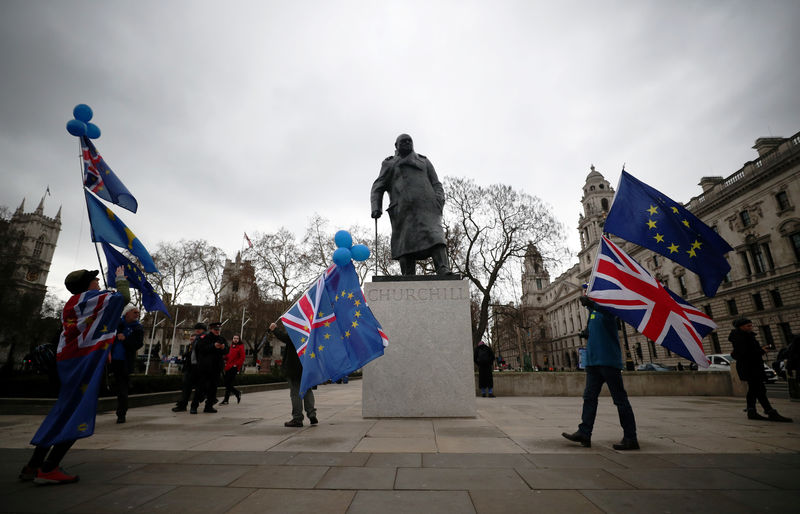By Guy Faulconbridge
LONDON (Reuters) - Britain's crisis of introspection took a bizarre turn on the eve of the latest parliamentary vote about Brexit: wartime hero Winston Churchill was placed in the dock of public discourse for his role in tackling a miners' strike more than 100 years ago.
The 2016 Brexit referendum showed a United Kingdom divided about much more than the European Union, and has fuelled soul-searching about everything from secession and immigration to capitalism, empire and modern Britishness.
Such musings amid the political crisis over Brexit have left allies puzzled by a country that was for decades touted as a confident pillar of Western economic and political stability.
Churchill, the closest thing Britain has to a national hero, was pulled into the maelstrom when the opposition Labour Party's second most powerful man - when asked - branded him a "villain" for his supposed suppression of striking miners in 1910.
The remark by John McDonnell, an admirer of Karl Marx who will be Britain's Chancellor if Labour win power, fits with a radical socialist interpretation of history that sees Churchill has the aristocratic foe of workers.
The response was furious.
"Churchill's reputation can stand a broadside from this mini poundland-Lenin," said Nicholas Soames, Churchill's grandson and a lawmaker in Prime Minister Theresa May's Conservative Party.
"He's perfectly at liberty to have whatever views he wants about my grandfather," said Soames, who later retweeted a picture of Churchill giving his famous V sign under the words "Dear John McDonnell..."
Churchill occupies a special place in British culture as the victor of World War Two and by far the most powerful British statesman of the 20th Century - a 'British bulldog' who could hold his own with Josef Stalin and Harry Truman.
Andrew Roberts, author of "Churchill - Walking With Destiny", said the hard left had always hated Churchill despite the fact that no Briton did as much to defeat fascism.
"Brexit is bound to bring on a certain degree of consideration of national identity but I don't think introspection is necessarily a bad thing," he said by telephone.
"If we can remind ourselves who we are and where we came from it can help us work out where we want to go," Roberts said. "Churchill is an essential part of our national identity so if we are thinking about identity of course we are going to be thinking about our heroes."
"THE BULLDOG"
To admirers, Churchill toiled through dark hours to save Britain and Europe from the Nazis, cemented the enduring U.S. alliance and defined the Cold War confrontation between the Soviet Union and the West.
"Winston Churchill saved this country and the whole of Europe from a barbaric fascist and racist tyranny and our debt to him is incalculable," said Boris Johnson, a Brexiteer who wrote an eccentric biography "The Churchill Factor: How One Man Made History".
Beyond the national legends, nuanced assessments of Churchill point to his prescience about the dangers posed by Germany, Adolf Hitler and the Soviet Union well before most had perceived the threats.
Questioning Churchill's legacy, though, is taboo, as even U.S. presidents have found.
Barack Obama removed a bust of Churchill from the Oval Office to make way for one of Martin Luther King, a step that enraged Brexiteers like Johnson and upset many Republicans. Obama, speaking in London later, said he loved Churchill.
Donald Trump put a different bust of Churchill into the Oval Office when he won the presidency.
To detractors, Churchill's views on the superiority of white people, his refusal to distribute wheat to starving people in India in 1943 and disparaging remarks about Mahatma Gandhi are evidence of a crueller statesman.
Such was his hatred of Communism that he was slow to recognise the threat from Benito Mussolini and later Japan, and he showed enthusiasm for bombing German civilians.
A trickle of criticism of about Churchill has been growing recent months, with one member of the Scottish parliament even calling him a white supremacist mass murderer.
Churchill earned loathing in Wales for his actions as interior minister in 1910 when he first prevaricated but eventually sent troops in to support police trying to quell riots by striking miners in Tonypandy. One miner died from head injuries said to have been inflicted by a police baton, The Times said this week.
Chris Bryant, a Labour lawmaker for Rhondda in Wales, said he agreed with McDonnell about Tonypandy but recognised Churchill's service in defeating fascism.
The Rhondda, where Tonypandy is located, was "the only seat where Churchill was never welcome", said Bryant. "He was wrong about India, too, but without his leadership and ability to reach out to Labour in 1940 we would never have fought and defeated fascism."
BLACK DOG?
May has a portrait of Churchill in her Downing Street study and a spokesman said the public would reach their own judgement about negative characterisations of the wartime leader.
"His strong leadership, determination and unwavering personality inspired our country through our darkest hour and helped Britain protect those values of peace and freedom that we hold so dear today," May's spokesman said.
As evidence of that continuing fascination, Gary Oldman won the best actor Oscar last year for his portrayal of Churchill in the war drama "Darkest Hour".
Churchill occasionally had dark moods which he termed "Black Dog", fuelling an entire subsection of Churchill speculation about whether his melancholy was something more serious.

"The United Kingdom is having several nervous breakdowns at once: in our parties, in our relationship with the EU, in our governance and even in our view of our own history," said Anand Menon, a professor of European politics and foreign affairs at King’s College London.